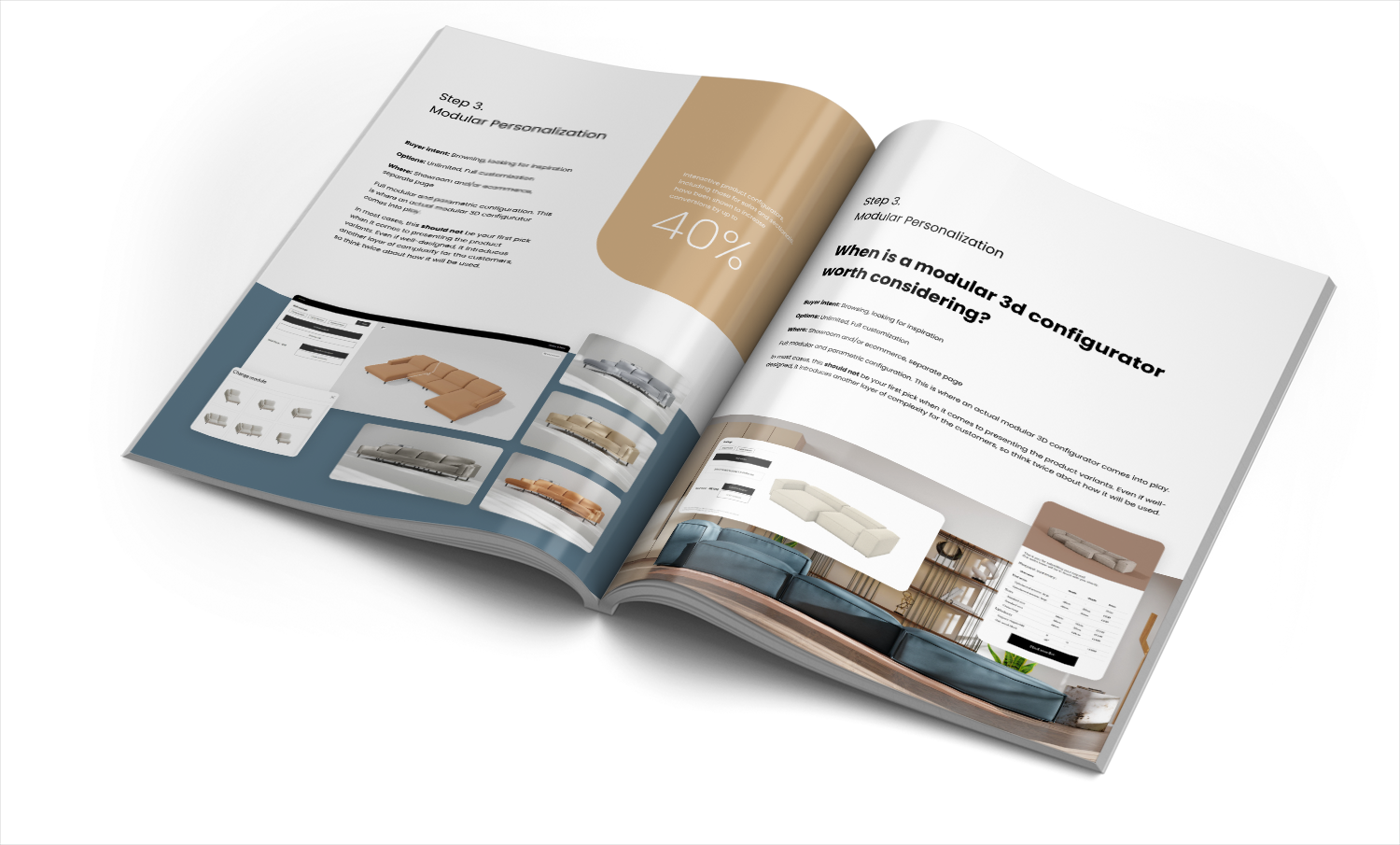The Ultimate 2025 Sofa Configuration Guide
Get your free copy todayy!

Content markdown: Manufacturers in the furniture industry face a relentless cycle: copying what's already successful, competing on price, and constantly playing catch-up. But focusing on faster quotes, sharper communication, and real-time visualization isn't just a trend—it's a sustainable way to stand out and command better margins. Here’s how digital transformation focused on speed and clarity drives real, measurable advantage for brands willing to do more than just follow the market.
Settling for imitation, or racing to produce knocked-off bestsellers cheaper, leads to the same dead end: shrinking margins, limited differentiation, and constant operational firefighting. The harsh reality is that efficiency and value no longer come from offering yet another version of what's already out there. Instead, brands snag real market share by answering the customer's most pressing question: "Why should I buy from you, and how quickly will I get exactly what I want?"
Table 1: Traditional Copying vs. Speed & Clarity-Driven Differentiation
| Approach | Traditional Copying | Speed & Clarity Framework |
|---|---|---|
| Basis for competition | Price, availability | Time-to-quote, seamless experience |
| Customer experience | Slow, manual, ambiguous | Interactive, visual, transparent |
| Margin pressure | High | Lower, improved by perceived value |
| Impact on brand | Commodity, interchangeable | Memorable, trust-driven, easy to refer |
One of the core frustrations buyers cite is waiting days—or even weeks—for custom quotes or final visuals. This friction leads to abandoned carts and a higher acquisition cost, especially in custom or modular furniture. In practice, companies using interactive 3D configurators or digital product personalization platforms have demonstrated:
Rapid Quote Generation: Complete proposals (including price and visuals) delivered in under 30 minutes, reducing the risk of buyer indecision. Implementing a pre-quote configurator can transform your quoting process from a bottleneck into a streamlined, high-conversion sales engine.
Faster Decision-Making: When buyers see exactly what their custom sofa or table will look like instantly, conversion rates rise by 20–40% post-implementation (per market case studies). Optimizing the customer journey with personalized 3D configurators plays a key role in accelerating decisions and reducing abandonment.
Streamlined Showroom Experience: Instead of endless back-and-forth and sample swatches, reps focus on value, not logistics. Using a showroom configurator enables seamless in-store personalization synced with online tools, reducing manual effort and improving customer engagement.
Buyers are overwhelmed by complexity in choices and unclear communication. Offering “endless options” is only a plus if the customer understands them without friction. Without visual aids and clear pricing, this becomes a liability.
Clear Visualization: 3D configurators offer photorealistic imagery for every variant, eliminating guesswork and setting clear expectations. Choosing between pre-rendered visuals and real-time rendering ensures optimal performance and user experience based on product complexity.
Real-Time Pricing: Transparent cost updates as options are selected help head off price objections and filter buyers before resource investment. Integrating instant pricing transparency into configurators improves quote accuracy and accelerates decision-making.
Elimination of Order Errors: Visual confirmation at every step leaves no room for miscommunication, reducing costly returns or dissatisfaction. In fact, a configurator can reduce returns and incorrect orders by validating selections and ensuring production-ready configurations.
Manually explaining configurations, quoting, and correcting misunderstandings absorbs hours that could be spent closing deals or nurturing new business. Smart automation shifts the burden:
Self-Service Exploration: Buyers engage with intuitive tools online, generating their own visuals and quotes. This reduces sales rep fatigue, as highlighted in how configurators reduce sales rep fatigue.
Sales Team Focus: With routine questions handled virtually, reps can dedicate time to higher-value consultative selling. Empowering even junior sales reps through guided tools enhances deal closure rates, as explained in can a configurator help junior sales reps close complex deals.
Reduced Sample Handling: Showroom staff no longer juggle dozens of physical samples—the configurator becomes the centerpiece, saving costs and accelerating decisions. Leveraging digital swatch and material management further streamlines visual assets and reduces operational overhead.
Attempting to be a jack-of-all-trades spreads your resources thin, leads to higher overheads, and clouds your value proposition. Specialization—supported by tools that maximize productivity and scale—enables you to:
Optimize production lines and supply chains for a focused portfolio, driving economies of scale. Integrating configurators tightly with ERP systems automates workflows and reduces costly errors.
Build a recognizable, expert brand associated with reliability, speed, and uncompromising clarity. Avoiding legacy product complexity during digital transformation ensures consistent customer experiences and faster go-to-market.
Increase buyer trust and loyalty, as customers experience an efficient process that demystifies every step. Providing clear, interactive product visualization transforms user experience from confusion to confidence.
Success in today’s furniture market comes not from being the cheapest or the most generic, but from being the fastest and the clearest. Digital configurators and streamlined communication break down barriers that slow you down and confuse the buyer.
If you're ready to transform your customer experience and secure a genuine competitive edge—faster quotes, clearer visuals, and fewer errors—schedule a free, 30-minute consultation. Together, we’ll identify where speed and clarity can most dramatically raise your sales, boost margins, and strengthen your brand in a crowded marketplace.
For further insight, consider exploring how configurators shorten the sales cycle and how to avoid confusing users with too many choices to optimize the overall customer journey.